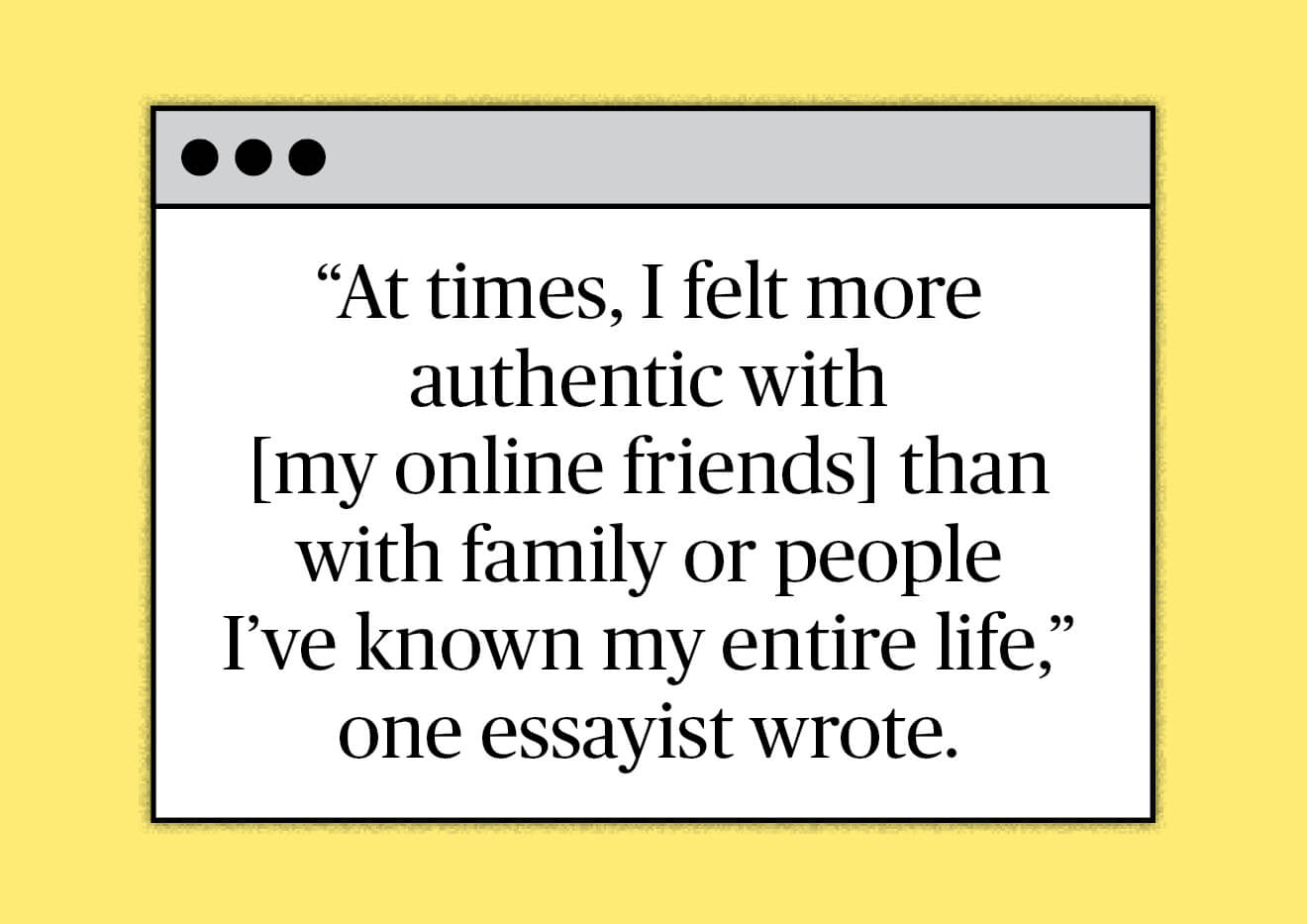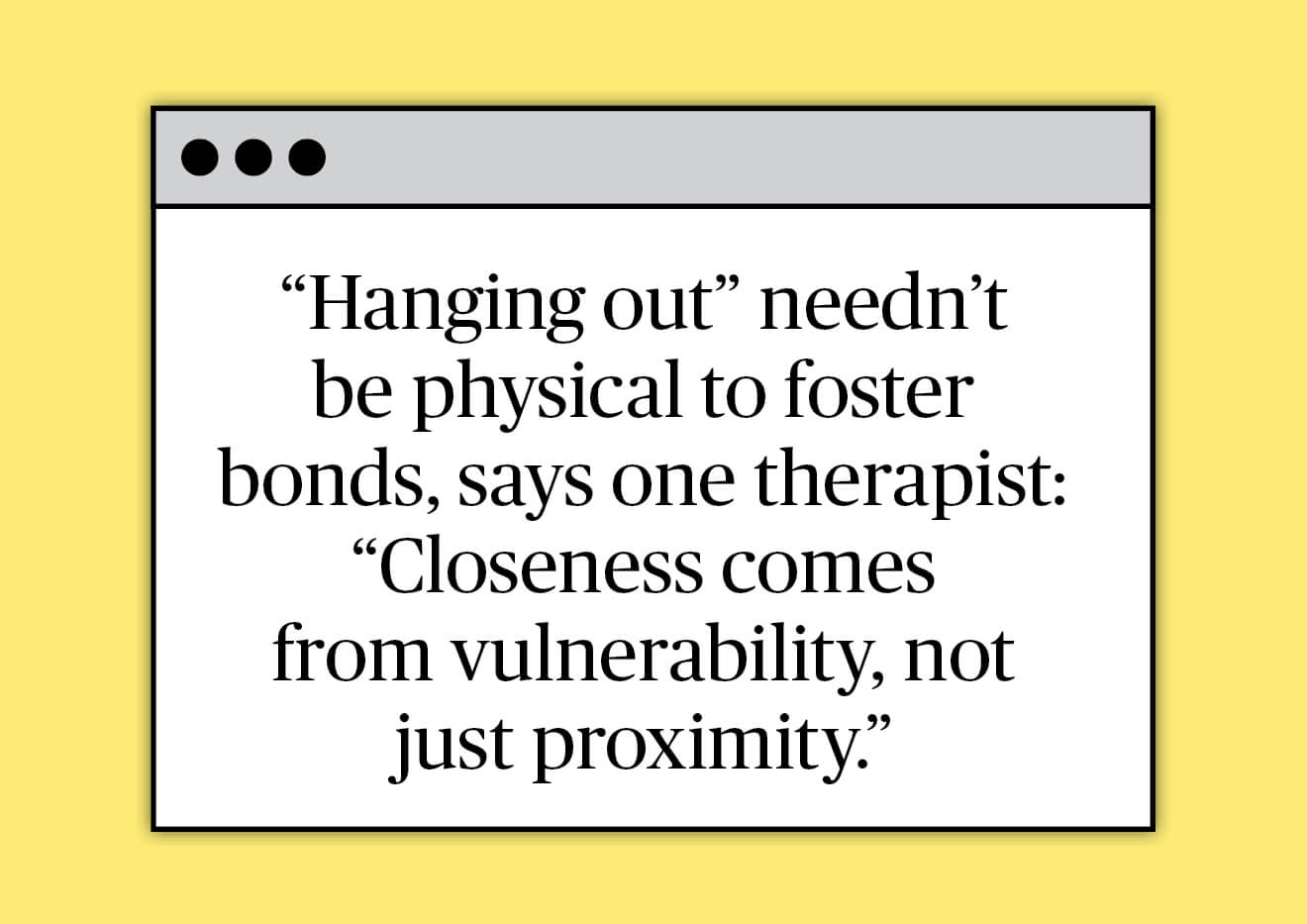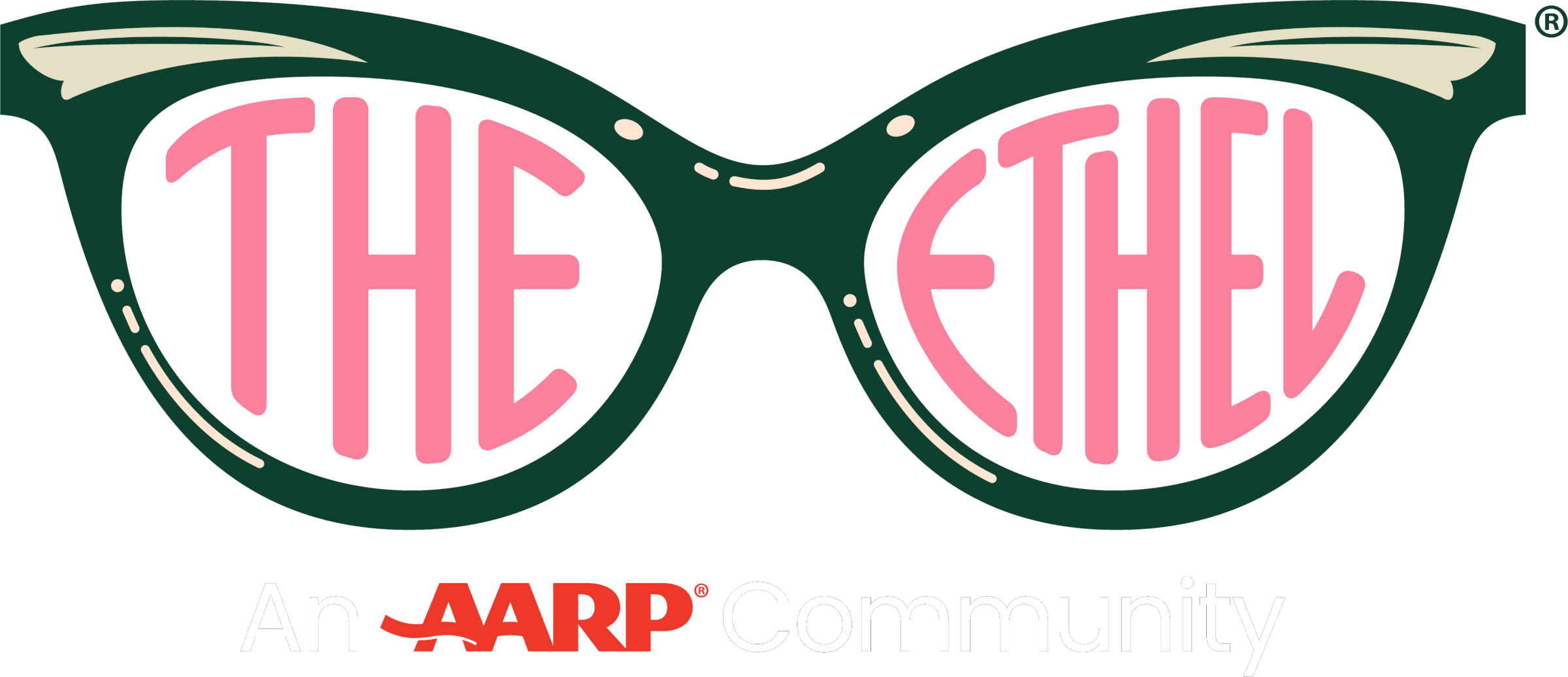Are Online Friendships Really Friendships?
Social media has created a sense of closeness with people you used to know—and those you may have never met
By Leslie Quander Wooldridge
Photograph by MARGEAUX WALTER

BY NOW, YOU’RE well aware of the upsides and downsides of social media use: the delight of easily staying in touch … and the agony of comparing your low moments to everyone else’s carefully curated highs. The pleasure of finding like-minded strangers who share your weird obsessions … and the pain of getting dragged into pitched political battles with people you used to admire.
For the most part, socializing online is linked to positive outcomes, such as “reduced loneliness and enhanced social connectedness,” says Lona Choi-Allum, senior research adviser with AARP Research. But studies over time show mixed results, which suggests that “the benefits really depend on how social media is used—not just whether it’s used,” Choi-Allum says. As the years roll on and you accumulate friends, as well as “friends” you rarely or never see, researchers are beginning to ask whether digital friendships can offer the same kinds of emotional and practical support that people have historically gained from people they see regularly. Can an online bestie really replace an in-person confidant?
THE RISE OF THE ALGORITHM
The way social media platforms work has evolved over time. For example, during its early years in the mid-2000s, Facebook had a chronological feed that displayed your friends’ posts from newest to oldest. But today, Facebook—the most commonly used platform for people 50-plus, per AARP Research—says it uses a ranking system with “over 100 different prediction models” to show you posts from people, groups and companies it thinks you’ll “find valuable,” whether you already follow them or not. Over on X (the rebranded Twitter), some users who had been banned for inflammatory posts under the previous ownership were restored to the platform in 2022 and even promoted into users’ feeds.
With these kinds of changes to their driving algorithms, social media is “not designed for nuance,” says Anna Goldfarb, author of Modern Friendship: How to Nurture Our Most Valued Connections, noting these platforms can exacerbate division. “It’s in the interest of the social media company to keep you on the page, writing comments, trying to explain yourself,” Goldfarb says.
At the same time, online communities where users gather to discuss a shared interest have grown in recent years, and that growth is expected to continue, according to the social media management company Sprout Social. Examples of these niche communities include Facebook groups, Reddit subreddits and Discord servers. “Under different circumstances, we might have never known one another,” wrote the essayist Blake Turck for Business Insider about an eight-person, intergenerational group of writers that meets online weekly. “At times, I felt more authentic with them than with family or people I’ve known my entire life.”
A FRIEND IN NEED
Historically, a friend has been someone who will help you get things done—a phenomenon called “mutual obligation” (think pitching in for home repairs or babysitting), according to James F. Richardson, a cultural anthropologist and author of Our Worst Strength: American Individualism and Its Hidden Discontents. Online-only friends can’t help you with those in-person tasks.
But another core aspect of developing a close friendship is gradual self-disclosure: opening up to share your thoughts and feelings. This can make online friendships challenging, especially for older men, says Justin Pere, a relationship counselor and certified sex therapist in Seattle. “Many men already struggle to share emotions, and social media can give the illusion of connection while actually making emotional avoidance easier,” he says. “Posting a photo of your dog or commenting on a friend’s vacation is not the same as saying [in real life], ‘Hey, I’ve been having a rough week.’ ”
That said, online friends can be real friends, “absolutely,” Pere believes. “But it’s important to consider whether those interactions meet your deeper emotional needs. Are you able to talk about hard things? Do you feel comforted or more connected after those chats?” he asks. “If it’s mostly surface-level or topic-specific, that still has value, but it may not fully replace the kind of relational nourishment that comes from broader, more emotionally present friendships.”

NURTURING CONNECTIONS
To get the most out of your online friendships, experts offer this advice.
1. Make a point to interact. If you’re just scrolling, you’re acting like a voyeur—and you’re not offering friendship to others. Instead, interact with their posts by sharing likes or comments. “The key is being intentional about if you see a post—not just to read it,” says Choi-Allum. “It’s nice to get that feedback or a response.”
Taneshia Laird, 56, a nonprofit leader in Boston, follows that advice, particularly with new online contacts. “In the early days of a new connection, I probably am more intentional about interacting with their posts,” she says. “I’m trying to convey that I care about that milestone that they had.”
And if you aren’t coming across your friends’ posts (perhaps due to algorithm changes), don’t be afraid to search for them. In addition, if you need help that online pals can provide, such as prayers or a professional introduction, don’t be shy about posting a request.
2. Don’t try to read minds. If you post something and don’t get the response you hoped for, assume a benign cause. “You might interpret silence as a snub. We’ve all done it,” says Goldfarb. But you don’t know what’s going on in people’s lives. Maybe they’re not even checking Facebook. Or maybe they’re overwhelmed by the responses to their posts. So give a little grace.
3. Take your temperature. If your connections with online friends are causing you anxiety or leaving you feeling hurt, take a step back, Goldfarb advises. “Ask yourself, ‘What’s going on? Am I feeling unloved? Am I feeling unseen? Am I feeling unworthy?’ And realize social media may not be helping you with those things.”
If you want to post about a happy or sad event in your life and you’re sensitive about potential reactions (or lack thereof), you might filter your privacy settings to avoid sharing with people who aren’t close friends. Or you might decide not to post about it at all.
4. Curate your following list. Out of politeness or obligation, you may be linked online to certain people whose posts make you feel bad. The fix? Cut them out of your feed. You can unfollow them if you’re bold (on certain platforms, they’ll be able to tell), but muting their posts is also an option. People who have been muted generally don’t know they’ve been silenced. “There’s no contract that you have to follow someone forever just because you’ve known them since childhood,” Goldfarb says.
5. Delight in small exchanges. Research on so-called “weak ties” shows that even minor interactions with people you don’t know that well can contribute to well-being. And while researchers often discuss in-person connections, a compliment from an online friend or an online congrats on your new pet project also has a benefit. So appreciate these exchanges for what they are—small ways you can share the human experience, be part of a community and feel some support. Not every exchange has to be deep to be meaningful.
6. Beware of scammers. Romance fraudsters have begun to invade online communities, law enforcement officials have found. To avoid being scammed, be very wary about sending personal information (like your address or family details) to someone you know only from the internet. And if an online-only “friend” asks you for money, they’re not your friend at all.

THE WAY TO DIG DEEPER
Just as you use the internet to keep track of old friends, you can use it to discover new ones. When health writer and publicist Monica Romano, 58, moved from Washington state to Coeur d’Alene, Idaho, two years ago, she joined a women-only Facebook group in her new city that offered meetups like book clubs and card games. “I connected with a few ladies ahead of my move,” she explains. “When I arrived [in Idaho], I joined them at Saturday morning coffee.”
It was a solid strategy, in Richardson’s view. “When social media works well, it’s used as a prompt to [connect] in real life and go hang out with people,” he explains.
But hanging out doesn’t necessarily need to be physical to deepen a friendship, Pere believes. It just needs to involve more than static words and pictures. Phone and video calls that let you see and hear your friend as another human being can trigger the same response. “Closeness comes from vulnerability, not just proximity, so yes, it’s possible to form a real friendship with someone you’ve never met,” Pere says. “But sustaining a deep connection often takes shared experiences, mutual care and some form of embodied presence, whether that’s voice, video or time spent together.”
Leslie Quander Wooldridge is a contributing writer who covers personal finance, health and lifestyle topics. She formerly worked as an editor for AARP THE MAGAZINE and Sisters from AARP, and she has written for outlets including Business Insider, Consumer Reports and Men’s Health.


AARP’s Online Social Groups for Women
The Girlfriend Social Club is a closed Facebook group where women 40+ are finding friends and support.
The Ethel Circle is a closed Facebook group where older women can talk openly and honestly about the very real joys and challenges associated with growing older.
Think you may have been scammed by an online pal? Call the AARP Fraud Watch Network Helpline for assistance with and advice on scams: 877-908-3360. Toll-free service is available Monday through Friday, 8 a.m. to 8 p.m. ET. Visit aarp.org/fraudwatchnetwork for more information.